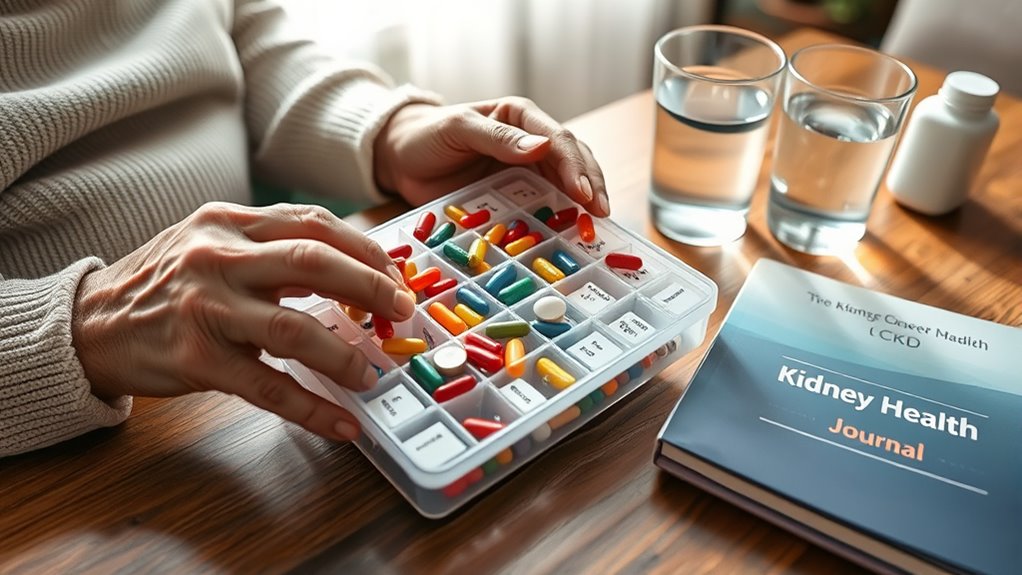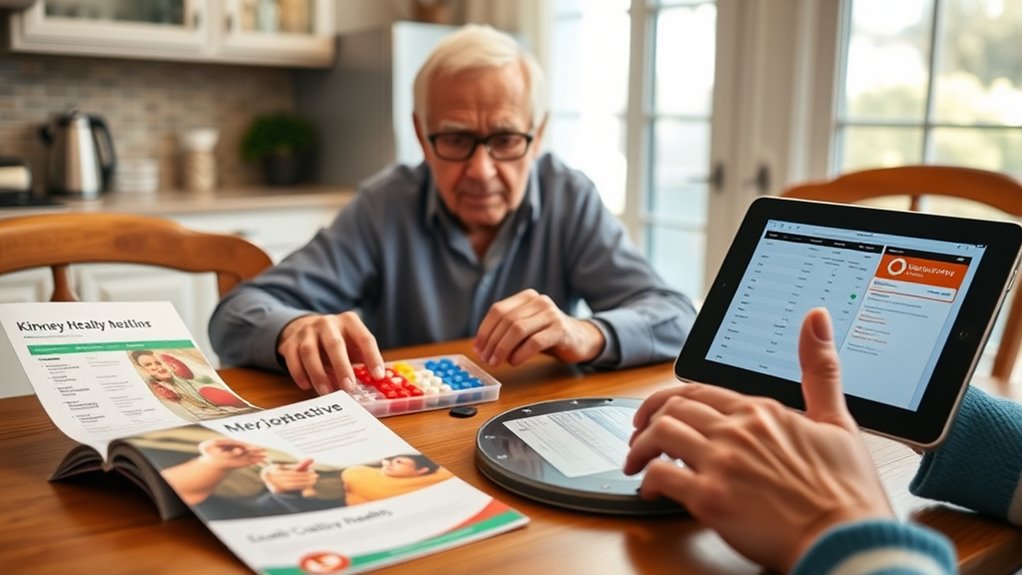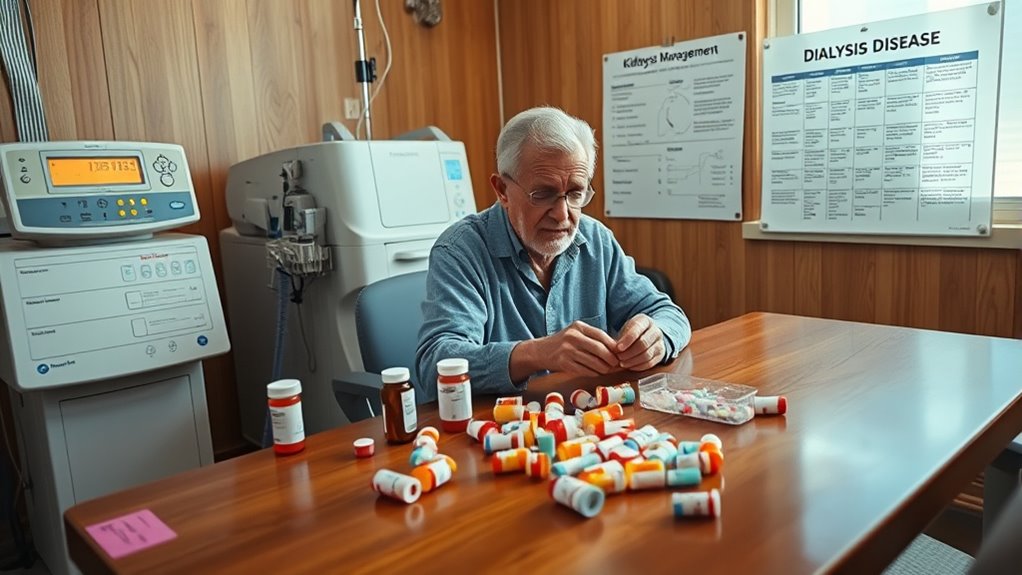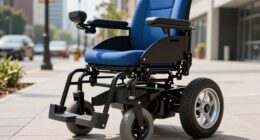Managing CKD medications in seniors involves regularly monitoring your kidney function to adjust drug doses safely, as declining function prolongs medication half-life and raises toxicity risks. It’s important to work closely with your healthcare team, keep track of your medications, and watch for side effects or interactions. Using reminders and simple organization tools can boost adherence. If you want to understand how different conditions influence your treatment, there’s much more to explore in the full approach.
Key Takeaways
- Regularly monitor kidney function (eGFR, serum creatinine) to guide medication adjustments and prevent toxicity.
- Tailor medication dosages and intervals based on CKD stage and renal clearance guidelines.
- Focus on managing blood pressure and mineral balance with appropriate, kidney-friendly medications.
- Educate seniors on medication purpose, proper use, and adherence strategies using tools like pill organizers and reminders.
- Collaborate with healthcare teams to review medications, monitor side effects, and ensure safe, effective therapy.
Understanding CKD Progression and Its Impact on Medication Management

Understanding how CKD progresses is essential for effectively managing medications in seniors. As your kidney function declines, your body becomes less efficient at filtering waste and drugs. This means medications may stay in your system longer, increasing the risk of side effects or toxicity. Early in CKD, you might not notice symptoms, but as the disease advances, complications like fluid retention, electrolyte imbalances, and increased toxin build-up become more common. These changes require careful medication adjustments to avoid harm. Knowing the stage of your CKD helps your healthcare provider decide which medications are safe and how to dose them correctly. It also emphasizes the importance of regular monitoring to catch any issues early and keep your treatment safe and effective. Understanding CKD progression is crucial in tailoring medication plans to minimize risks and optimize benefits. Additionally, understanding the stages of CKD can help patients and providers anticipate potential complications and adjust treatments proactively.
Key Medications Commonly Used in Seniors With CKD

Managing medications for seniors with CKD often involves controlling blood pressure and addressing bone health concerns. You’ll need to monitor blood pressure closely and choose medications that protect your kidneys while minimizing side effects. Ensuring proper bone health is also essential to prevent fractures and maintain overall well-being. Being aware of air quality improvements can help in managing medication costs and access. Additionally, understanding how creativity can be cultivated can support your mental well-being during ongoing health management. Staying informed about electric bike models and features can also support mobility and independence for seniors managing chronic conditions.
Monitoring Blood Pressure Effectively
Monitoring blood pressure effectively is essential for seniors with CKD because it helps prevent further kidney damage and reduces cardiovascular risks. Regularly check your blood pressure at home or during healthcare visits, using a reliable monitor. Keep a record of your readings to share with your healthcare provider, as trends can signal when adjustments are needed. Aim to maintain blood pressure within your target range, often below 130/80 mm Hg, but follow your doctor’s specific advice. Avoid sudden changes in activity or stress before measurements, and sit quietly for a few minutes beforehand. Consistent monitoring helps identify issues early, allowing your healthcare team to adjust medications or lifestyle habits promptly, ultimately protecting your kidney function and supporting overall health.
Managing Bone Health Concerns
Have you considered how crucial proper medication management is for maintaining bone health in seniors with CKD? Many seniors rely on medications like phosphate binders to control mineral levels and prevent bone deterioration. Vitamin D supplements are also common to improve calcium absorption and support bone strength. However, it’s essential to monitor for side effects, such as hypercalcemia from excessive vitamin D or gastrointestinal issues from phosphate binders. Your healthcare provider will tailor your treatment plan, adjusting doses as needed to balance mineral levels and reduce fracture risks. Staying informed about your medications helps ensure your bones stay strong and healthy. Regular lab tests and open communication with your care team are key to managing bone health effectively in seniors with CKD.
Adjusting Drug Dosages Based on Kidney Function

Since kidney function often declines with age, adjusting drug dosages is essential to guarantee safe and effective treatment in seniors. When prescribing medications, you need to consider the estimated glomerular filtration rate (eGFR) or serum creatinine levels to determine how well the kidneys are functioning. If kidney function decreases, you should lower the medication dose or extend the dosing interval to prevent toxicity. Some drugs are more dependent on renal clearance, so they require careful adjustment. Always consult dosing guidelines based on kidney function and monitor kidney parameters regularly. Remember, under-dosing can reduce medication effectiveness, while over-dosing risks adverse effects. Proper dose adjustments help balance treatment benefits with safety, ensuring seniors receive ideal care. Understanding medication clearance is crucial for making informed dosing decisions in patients with impaired kidney function. Additionally, recognizing signs of dose-related toxicity can help prevent complications and ensure optimal therapy. Regular assessment of kidney function enables timely dose modifications, further safeguarding patient health, and being aware of individual variability can improve personalized treatment approaches. Incorporating knowledge about IRA investing principles, such as diversification and proper account management, can also be beneficial when planning long-term health strategies.
Monitoring for Side Effects and Drug Interactions

Because seniors often take multiple medications, carefully watching for side effects and drug interactions is essential to guarantee safety. You should regularly monitor for new or worsening symptoms, such as dizziness, nausea, or changes in mental status, which could indicate adverse reactions. Keep track of any unusual symptoms and report them promptly to your healthcare provider. Be aware that some medications can interact, reducing effectiveness or increasing toxicity; for example, certain drugs may raise potassium levels or cause blood pressure swings. Always inform your provider about all medicines you’re taking, including over-the-counter drugs and supplements. Regular follow-up appointments and lab tests help detect side effects early, ensuring your treatment remains safe and effective.
Strategies for Enhancing Medication Adherence

To improve your medication adherence, consider simplifying your routine so it’s easier to follow. Using reminder tools like alarms or pill organizers can help you stay on track. These strategies make managing your kidney disease medications more manageable and less overwhelming. Additionally, understanding your medication’s importance and how it impacts your health can motivate consistent usage medication management techniques. Incorporating essential oils such as lavender or eucalyptus in your daily routine may also promote relaxation and reduce stress, supporting overall adherence. Practicing vibrational alignment techniques can further enhance your motivation and positive mindset towards maintaining your medication regimen. Being mindful of passive voice detection can also help you craft clearer, more direct instructions for medication routines. Engaging in digital literacy practices can support your understanding of medication instructions and health information, making it easier to follow your prescribed regimen.
Simplify Medication Routines
Simplifying medication routines can considerably improve adherence in seniors with kidney disease. To make routines easier, consider consolidating medications when possible, so you take fewer pills at designated times. Organize medications using pillboxes sorted by day and dose, reducing confusion. Establish consistent daily schedules aligned with your routine, like meals or bedtime, to build habits. Here’s a helpful overview:
| Strategy | Benefit |
|---|---|
| Consolidate medications | Fewer doses, less chance of missing a dose |
| Use pill organizers | Visual cues improve adherence |
| Align with daily routines | Easier to remember and incorporate into your day |
These steps simplify your medication routine, making it easier to stay consistent and manage your health effectively.
Use Reminder Tools
Using reminder tools can substantially boost your chances of sticking to your medication schedule. These tools help you stay consistent and avoid missed doses. Here are four effective options:
- Alarm clocks or smartphone alerts – Set daily alarms to remind you when it’s time to take your medications.
- Medication reminder apps – Use apps designed to track doses and alert you when it’s time to take your meds.
- Pill organizers with timers – Invest in containers that have built-in timers or alarms to prompt you.
- Calendar or wall charts – Mark off each dose on a calendar or chart to visualize your adherence.
The Role of Interprofessional Teams in Care Coordination

How does an interprofessional team improve care coordination for seniors with kidney disease? By bringing together various experts, you get extensive, personalized care. Each team member, from nephrologists to dietitians, contributes unique insights, ensuring medication plans suit the patient’s overall health. This collaborative approach reduces errors, avoids medication conflicts, and promotes consistency across providers. It also streamlines communication, so everyone stays informed and responsive. Ice cream flavors and ingredients are diverse, much like the tailored medication strategies in comprehensive care. Here’s how different roles work together:
| Team Member | Role in Care Coordination |
|---|---|
| Nephrologist | Manages kidney-specific treatments |
| Pharmacist | Reviews medications for interactions |
| Nurse | Monitors patient adherence and symptoms |
| Dietitian | Advises on nutrition and medication timing |
| Social Worker | Addresses psychosocial needs and support |
This teamwork creates a seamless, well-informed care experience for seniors.
Patient Education and Empowerment for Medication Management

Effective patient education is essential for managing medications in seniors with kidney disease, as it empowers you to take an active role in your treatment. When you understand your medications, you can spot side effects early, adhere correctly, and communicate effectively with your healthcare team. Here are four key ways to stay informed and in control:
- Ask your healthcare provider about your medications’ purpose and proper use.
- Keep a detailed medication list, including dosages and schedules.
- Recognize common side effects and when to seek help.
- Use medication management tools, like pill organizers or reminder apps.
- Explore Remote Hackathons to learn about innovative health solutions and connect with experts developing new tools for medication management.
Navigating Special Considerations in Dialysis and Transplant Patients

Managing medications for dialysis and transplant patients requires careful attention to unique challenges, as these treatments markedly impact your medication needs and routines. Dialysis can remove certain drugs from your system, requiring dose adjustments or timing changes to guarantee effectiveness. For transplant patients, immunosuppressants are crucial to prevent rejection but need strict adherence to avoid complications. You must also watch for drug interactions, as your medications may interact with each other or with dialysis-related procedures. Additionally, side effects like electrolyte imbalances or infections need close monitoring. Coordination between your healthcare team is essential to optimize your medication plan. Staying informed about your treatments helps you manage your condition effectively and reduces risks associated with these complex therapies.
Future Directions and Innovations in CKD Medication Care

Advances in technology and research are paving the way for more personalized and efficient medication care for CKD patients, especially seniors. These innovations aim to improve outcomes and reduce side effects. Here are four exciting developments to watch:
- Pharmacogenomics: Tailors medication choices based on your genetic profile, increasing effectiveness and safety.
- Smart pill bottles and apps: Help you track medication adherence and remind you when to take doses.
- Biomarker testing: Offers early detection of medication responses or complications, enabling timely adjustments.
- AI-driven decision support: Assists healthcare providers in optimizing medication regimens for each patient’s unique needs.
These innovations promise to make CKD medication management more precise, safer, and user-friendly, improving your quality of life.
Frequently Asked Questions
How Can Caregivers Support Medication Management for Seniors With CKD?
You can support seniors with CKD by helping them organize their medications with pillboxes or charts, ensuring they take the right doses at the right times. Remind them of medication schedules and watch for side effects. Encourage open communication with healthcare providers for any concerns. By staying involved and attentive, you help them manage their condition effectively and reduce risks of complications.
What Lifestyle Changes Complement Medication Therapy in CKD Seniors?
You can help seniors with CKD by encouraging healthy lifestyle changes that support their medication therapy. Promote a balanced, kidney-friendly diet low in sodium, phosphorus, and potassium, and make sure they stay well-hydrated. Encourage regular physical activity suited to their abilities, manage blood pressure and blood sugar levels, and avoid smoking and excessive alcohol. These steps work together with medications to slow CKD progression and improve overall well-being.
Are There Alternative Therapies to Reduce Medication Burden in CKD?
While medications are essential, exploring alternative therapies can ease your treatment burden. You might consider dietary modifications, like reducing salt and protein intake, or incorporating exercise to improve overall health. Herbal supplements or acupuncture could offer additional support, but always consult your healthcare provider first. These approaches can complement your medication regimen, helping manage CKD symptoms more holistically and potentially reducing the need for higher medication doses.
How Do Cognitive Impairments Affect Medication Adherence in Seniors?
Cognitive impairments can substantially impact your ability to remember and follow your medication schedule. You might forget doses or take incorrect amounts, leading to ineffective treatment or adverse effects. To improve adherence, you should use reminders, pill organizers, and involve caregivers when possible. Staying organized and communicating regularly with your healthcare team helps ensure you manage your medications safely and effectively despite cognitive challenges.
What Are the Signs of Medication Toxicity Specific to CKD Patients?
You should watch for signs like nausea, confusion, fatigue, and swelling, which indicate medication toxicity in CKD patients. Changes in mental status, irregular heartbeat, or unexplained itching also signal trouble. Since your kidneys struggle to filter toxins, medications can build up, causing these symptoms. Regular monitoring and communication with your healthcare provider are key to catching toxicity early and keeping your treatment safe.
Conclusion
By understanding how CKD affects medication needs, you can better manage your treatments and avoid complications. Staying informed and working closely with your healthcare team isn’t just helpful—it’s essential. Some believe that personalized care can slow CKD progression, and evidence suggests tailored strategies do improve outcomes. Keep advocating for yourself, ask questions, and stay engaged. Your active involvement could truly make a difference in managing your condition and maintaining quality of life.









